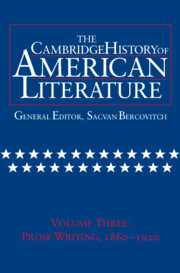Book contents
- Frontmatter
- Introduction
- THE AMERICAN LITERARY FIELD, 1860–1890
- LITERARY FORMS AND MASS CULTURE, 1870–1920
- 1 Museum Realism
- 2 Howells, James, and the republic of letters
- 3 Women and Realist authorship
- 4 Chesnutt and imperial spectacle
- 5 Wharton, travel, and modernity
- 6 Adams, James, Du Bois, and social thought
- PROMISES OF AMERICAN LIFE, 1880–1920
- BECOMING MULTICULTURAL: CULTURE, ECONOMY, AND THE NOVEL, 1860–1920
- Chronology 1860–1920
- Bibliography
- Index
2 - Howells, James, and the republic of letters
from LITERARY FORMS AND MASS CULTURE, 1870–1920
Published online by Cambridge University Press: 28 March 2008
- Frontmatter
- Introduction
- THE AMERICAN LITERARY FIELD, 1860–1890
- LITERARY FORMS AND MASS CULTURE, 1870–1920
- 1 Museum Realism
- 2 Howells, James, and the republic of letters
- 3 Women and Realist authorship
- 4 Chesnutt and imperial spectacle
- 5 Wharton, travel, and modernity
- 6 Adams, James, Du Bois, and social thought
- PROMISES OF AMERICAN LIFE, 1880–1920
- BECOMING MULTICULTURAL: CULTURE, ECONOMY, AND THE NOVEL, 1860–1920
- Chronology 1860–1920
- Bibliography
- Index
Summary
THE CIVIC USES OF HIGH CULTURE
Matthew Arnold's Culture and Anarchy (1869) gave new meaning and prominence to the word “culture.” “I shall not go so far as to say of Mr. Arnold that he invented it,” Henry James wrote of the word, “but he made it more definite than it had been before – he vivified it and lighted it up.” Surely part of what “vivified” culture in the educated vernacular was Arnold's pairing of the word with “anarchy” as its defining antonym. The red-flag urgency of “anarchy” made “culture” its cool and tranquil opposite, an antidote against social and political turmoil. Culture was conceived as a neutral or “disinterested” sphere of human experience, a sphere in which the warring interests of factions could recede in favor of a shared light for intelligent reflection on modern life. W. E. B. Du Bois had such a sphere in mind when he wrote in The Souls of Black Folk (1903) that African Americans wished to be “co-workers in the kingdom of culture” rather than being relegated to the role of “problem” in the sphere of politics. But Du Bois also alerts us to a certain faultline in the Arnoldian notion of culture. So long as the “kingdom of culture” is segregated – even so long as it is a solution to segregation, as Du Bois wishes – it partakes of the fractious problem of race. Even as the transcendence or resolution of politics, the sphere of culture is necessarily political.
- Type
- Chapter
- Information
- The Cambridge History of American Literature , pp. 107 - 136Publisher: Cambridge University PressPrint publication year: 2005



